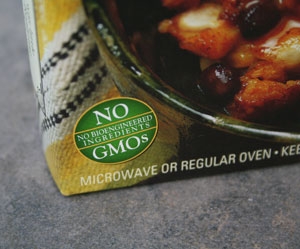
American grocery stores began selling GMO foods in the 1990s and today stock thousands of items that contain genetically modified corn, soybeans and other crops. To date, no evidence has come to light indicating that foods developed using genetic engineering techniques pose risks greater than food produced using traditional methods.
Still, GMO foods are rejected by a segment of the population. Critics say the long-term effects of eating GMO foods are unknown, that genetically modified genes could flow into weeds or native plants, posing ecological risks, and that higher seed prices for GMO products prevent small-scale producers from competing with large farms. Without mandatory labeling, they find it difficult to avoid products containing GMOs.
UC Cooperative Extension alfalfa specialist Dan Putnam said he is generally in favor of GMO labeling in the United States, “as long as it’s not a warning and not mandatory."
“Consumers should be able to know more or less what they’re eating,” Putnam said.
However, mandatory labeling would raise a number of questions, including what exactly is a GMO?
"Triticale (a forage fed to dairy cows) is a new species, the result of an interspecific cross between wheat and rye, created by humans in the 1950s – a GMO if there was ever one, since it never existed before humans mixed up the DNA," Putnam said.
UC biotechnology specialist Peggy Lemaux suggests a possible alternative to mandatory labeling.
"If there is widespread agreement on the need for labeling, then a market could arise for GMO-free labeled foods for which people would pay extra," Lemaux said. "This would be similar to the current situation with Kosher and organic foods. Since having access to GMO-free foods is not a matter of food safety, but food preference, this approach would lead to a situation in which only those people who want the extra information would pay for it."
The European Union, Japan, Malaysia and Australia currently require labeling on foods that contain genetically modified ingredients. Whether labeling becomes mandatory in the United States or not, supplying food to these countries requires a system for production, separation and traceability of GMO and non-GMO products.
“There is a human factor involved,” Putnam said. “Neighbors have to get along and respect each others’ points of view.”
A reasonable level of tolerance will also help farmers using different production systems to coexist with one another. It is unrealistic to expect 100 percent food purity in a non-GMO food stream, Lemaux said. A small amount of engineered genes in non-GMO food can result from pollen flow or unintentional mingling during post-harvest storage, transportation or food processing.
But coexistence of different varieties and production methods is not new to California food production. Non-GMO farmers can coexist with conventional farmers by using some of the same good-neighbor farming agreements that have long been common in the agriculture industry.
For more information on GMOs in agriculture, see the biotechnology and Roundup Ready alfalfa section on Putnam's alfalfa website and Lemaux's biotechnology website, UCbiotech.org.